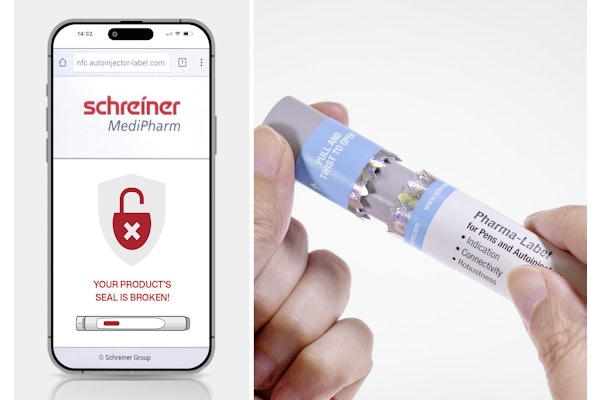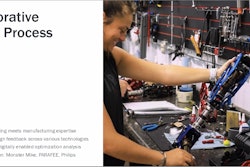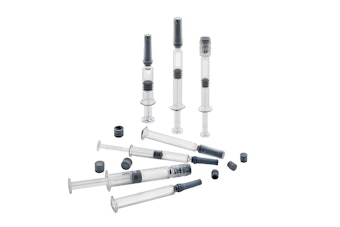Because biological products tend to be unstable, they will add complexity to the production process. Also, unlike many drugs, biological products are somewhat insulated against the threat of generics. That's in part to the newness of bio-based products, and the complexity in substituting similar products for them.
Biopharmaceutical advancements was one of many subjects discussed at
Pharmintech 2007 June 12 during an international conference event entitled, "Research, development and innovation in technology for pharmaceutical processing." Other observations from the conference included the following:
• Pharmaceutical manufacturers need to educate packaging suppliers about their needs and operations, yet it would benefit partnership efforts if manufacturers also visited supplier facilities to understand their capabilities and operations. Think of this in-field information exchange similar to ethnographic research.
• Pressures on pharmaceutical manufacturers continue to build as government agencies and the companies themselves push to reduce costs. Meanwhile, global medical prices continue to decline, consumers demands escalate, R&D and operating costs rise, product lifecycles shorten, and many drug patents expire.
• As globalization continues and companies do business around the world, people will go from switching jobs in the same geographic area or country to moving from one country to another to accept new positions.
• Consolidation and mergers and acquisitions continue around the globe, with generic drug makers are also experiencing this activity. India appears to be a hotbed of such business transactions, led by companies such as Dr. Reddy's and Ranbaxy.
• Although India and China continue to show amazing growth, their countries face major challenges regarding environmental and infrastructure issues.
• Newer technologies merit serious consideration, yet they may not always be the best option. Your company needs to determine if technologies such as RFID and PAT will provide the benefits these technologies tout. Companies sometimes make expensive investments in information technology without fully implementing them and reaping their potential benefits. Enhancing your company's technology will likely require enhancing the training of employees to implement the technology.
That said, the pharmaceutical industry in general is too slow to change and too averse to risk. There are understandable reasons for that, but it must increase its pace while still remembering that the safety of the patient is still the top priority.
The conference included presentations from professionals at Italian-based pharmaceutical company Chiesi Farmaceutici Spa, Gert Moelgaard of Novo Nordisk in Denmark, Theodore Iliopoulos with Polpharma in Poland, PG Shrotriya with the Indian Pharmacopoeia Commission, Walter Schiess with Schott Pharmaceutical Systems in Switzerland, Frank Gomez with Abbott in the United States, Paul Merrick with AstraZeneca in the United Kingdom, and Roberto Guerrieri with Silicon Biosystems and Mindseeds Laboratories in Italy.
The Congress was organized by Italy's ISPE affiliate in co-operation with the Parenteral Drug Assn.'s Italy Chapter, and in conjunction with Ipack-Ima.
Held June 12-14 at the Exhibition Center of BolognaFiere in Bologna, Italy, Pharmintech 2007 follows the initial event in 2004. The exhibition for the pharmaceutical, personal care and nutraceutical industries is scheduled to occur at the site every three years. Approximately 300 supplier companies had exhibits at Pharmintech.
According to Ipack-Ima Spa, 35% of those companies showed packaging and labeling machines, 25% packing equipment, 16% auxiliary equipment, accessories, and components, 10% packaging materials, 8% infrastructure, plant and logistics, and 6% services.
--By Jim Butschli, Editor
Biopharmaceutical advancements was one of many subjects discussed at
Pharmintech 2007 June 12 during an international conference event entitled, "Research, development and innovation in technology for pharmaceutical processing." Other observations from the conference included the following:
• Pharmaceutical manufacturers need to educate packaging suppliers about their needs and operations, yet it would benefit partnership efforts if manufacturers also visited supplier facilities to understand their capabilities and operations. Think of this in-field information exchange similar to ethnographic research.
• Pressures on pharmaceutical manufacturers continue to build as government agencies and the companies themselves push to reduce costs. Meanwhile, global medical prices continue to decline, consumers demands escalate, R&D and operating costs rise, product lifecycles shorten, and many drug patents expire.
• As globalization continues and companies do business around the world, people will go from switching jobs in the same geographic area or country to moving from one country to another to accept new positions.
• Consolidation and mergers and acquisitions continue around the globe, with generic drug makers are also experiencing this activity. India appears to be a hotbed of such business transactions, led by companies such as Dr. Reddy's and Ranbaxy.
• Although India and China continue to show amazing growth, their countries face major challenges regarding environmental and infrastructure issues.
• Newer technologies merit serious consideration, yet they may not always be the best option. Your company needs to determine if technologies such as RFID and PAT will provide the benefits these technologies tout. Companies sometimes make expensive investments in information technology without fully implementing them and reaping their potential benefits. Enhancing your company's technology will likely require enhancing the training of employees to implement the technology.
That said, the pharmaceutical industry in general is too slow to change and too averse to risk. There are understandable reasons for that, but it must increase its pace while still remembering that the safety of the patient is still the top priority.
The conference included presentations from professionals at Italian-based pharmaceutical company Chiesi Farmaceutici Spa, Gert Moelgaard of Novo Nordisk in Denmark, Theodore Iliopoulos with Polpharma in Poland, PG Shrotriya with the Indian Pharmacopoeia Commission, Walter Schiess with Schott Pharmaceutical Systems in Switzerland, Frank Gomez with Abbott in the United States, Paul Merrick with AstraZeneca in the United Kingdom, and Roberto Guerrieri with Silicon Biosystems and Mindseeds Laboratories in Italy.
The Congress was organized by Italy's ISPE affiliate in co-operation with the Parenteral Drug Assn.'s Italy Chapter, and in conjunction with Ipack-Ima.
Held June 12-14 at the Exhibition Center of BolognaFiere in Bologna, Italy, Pharmintech 2007 follows the initial event in 2004. The exhibition for the pharmaceutical, personal care and nutraceutical industries is scheduled to occur at the site every three years. Approximately 300 supplier companies had exhibits at Pharmintech.
According to Ipack-Ima Spa, 35% of those companies showed packaging and labeling machines, 25% packing equipment, 16% auxiliary equipment, accessories, and components, 10% packaging materials, 8% infrastructure, plant and logistics, and 6% services.
--By Jim Butschli, Editor


















